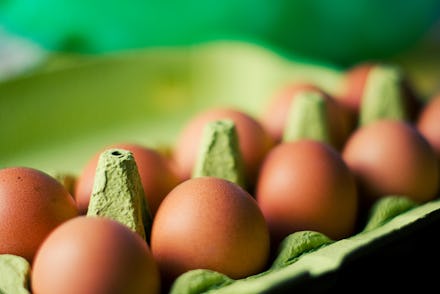The 17 Most Expensive Foods To Buy Organic

It's no secret that organic food is more expensive than its non-organic counterpart.
A new study released by the U.S. Department of Agriculture revealed that certain organic foods in particular, including eggs and dairy products, can put a serious strain on your wallet, Food Business News reported.
Americans are shelling out 82% more for organic eggs, the highest premium among the 17 products in the study. The premium on organic milk is 72%, and on yogurt, it's 52%. These stats reflect data collected by Nielsen from 2004 to 2010.
Organic's high prices can be explained by farmers' supply costs (organic-producing animals must be provided with the organic food and pasture land), "and only use organic health care practices, which do not allow the use of antibiotics or growth hormones," the USDA said.
Is it worth spending your dough on organic eggs? While organic produce is often worth the splurge because, according to the Environmental Working Group, non-organic fruits and veggies are often contaminated with pesticides, conventional eggs are less offensive when it comes to harmful contaminants.
In 2011, the USDA tested almost 500 egg samples and found zero percent pesticide residue. It seems too good to be true, but it's actually not surprising.
Pat Curtis, poultry scientist at Auburn University, told the Washington Post that hens raised for egg laying aren't typically given antibiotics. If they are, there's a mandatory waiting period before their eggs can be sold.
Moreover, odds are good you might not even taste the difference between a plate of organic and non-organic scrambled eggs. Serious Eats reported that in a blind taste test, participants did not prefer the taste of organic to conventional eggs.
The most compelling argument for spending your cash on organic eggs: if you care how chickens are treated. "Certified Humane," "Animal Welfare Approved," and "Organic" labels all maintain that the chickens laying the eggs you buy are raised in cage-free environments, ABC News reported.